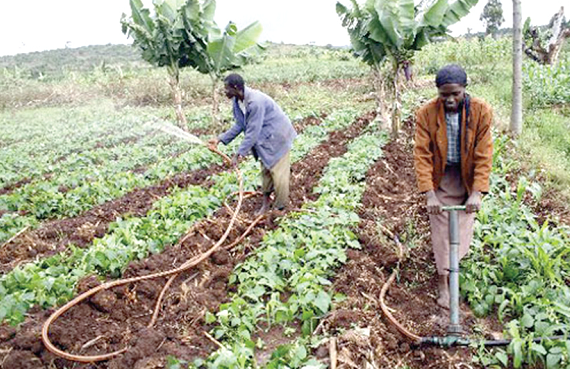
Focus on smallholder farmers- Expert urges govt
THE Director of Farmer Services at Farmerline, Mr Bright Adu Schandorf, has cautioned the government to take a critical look at supporting smallholder farmers.
“The government could be chasing the wind if the intended investment in the agriculture sector is not focused on addressing the challenges facing smallholder farmers, who form the majority of the agriculture value chain,” he stated.
“Planting for food and jobs campaign to some extent is inadequate without the provision of reliable and profitable market access for smallholder farmers,” he said.
Mr Schandorf, who is also an agric value chain expert, was speaking to the paper last Tuesday ahead of the Graphic Business/Stanbic Bank Breakfast Meeting to be held on October 31 at the plush Labadi Beach Hotel in Accra.
Empowering the poor
Mr Schandorf noted that for the past decade, performance of the agricultural sector had been declining and the rural poor, who constituted the chunk of the smallholder farmers, were living below the poverty line.
As a means to curtail the dwindling fortunes of smallholder farmers, he said Farmerline had begun the distribution of farm inputs to help smallholder farmers to access quality and affordable inputs.
“Insightfully, our innovative technology is helping to provide inputs on credit for farmers with good credit score without any collateral,” he said.
Role of agriculture
In a related development, the Director of the Institute of Statistical and Economic Research (ISSER), Professor Felix Ankomah Asante, on October 10, this year, emphasised the key role agriculture could play in the growth of the economy if smallholder farmers in the rural areas were empowered to maximise their production.
At the launch of ISSER’s 2016 review of the state of the economy, Prof. Ankomah Asante said majority of the country’s population were involved directly or indirectly in agriculture and hence, progress in the economy would be stifled if the right resources were not channeled to the farmers who needed it most.
“Financing agriculture is so key in this country, it’s key not because of its contribution to GDP, it’s key because most of the population is in agriculture and if you cannot help those in agriculture, there’ll be problems in the country in terms of trying to reduce poverty.
“We know that the rural population is into agriculture and most of the poverty is also a rural phenomenon and that’s why it’s important not just because it contributes to GDP but because we want to turn the economy around,” he added.
Reducing food imports
However, some experts have commended the government’s “one-district, one- warehouse” initiative as a means to address the annual post harvest losses of smallholder farmers.
At the launch of the one-district, one-warehouse initiative at Ejura on October 18, the President, Nana Addo Dankwa Akufo-Addo, observed that the initiative was the beginning of a drive to reduce the huge food imports.
President Akufo-Addo explained that one of the objectives of the warehouse initiative was to increase production of staples such as maize by 30 per cent, rice by 25 per cent, sorghum by 28 per cent and soya bean by 25 per cent.